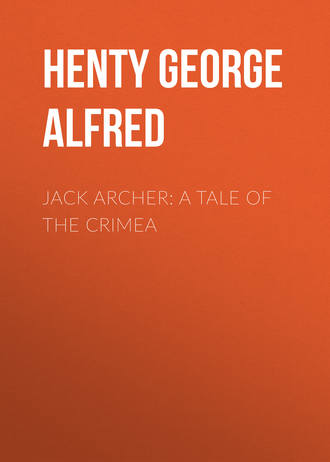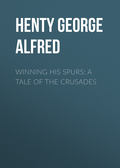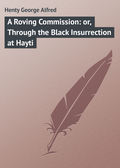
Henty George Alfred
Jack Archer: A Tale of the Crimea
CHAPTER XII.
PRISONERS ON PAROLE
Day after day the convoy made its way northward without any incident of importance happening. The midshipmen were glad to find that, thanks to their sheepskin cloaks and pointed hoods, they passed through the towns without attracting any attention whatever.
The convoy lessened in length as it proceeded. The animals broke down in great numbers and died by the road, under the task of dragging the heavy wagons through the deep snow.
At a town of some size, where they halted for two days, relief was afforded by the wheels being taken off the wagons, and rough runners affixed, the wheels being placed on the carts, as that they could be put on again in case of a thaw.
Famine, however, did more that fatigue in destroying the animals; for although good exertions had been made to form depots of forage along the roads, these were exhausted faster than they could be collected by the enormous trains, which, laden with provisions and warlike stores, were making their way to Sebastopol from the interior of Russia. There was no lack of food for the men, for ample stores of black bread were carried, and a supply of meat was always obtainable at the end of the day's journey by the carcase of some bullock which had fallen and then been shot during the day's march.
But though the train diminished in length, its occupants diminished even more rapidly. Every morning, before starting, a burying party were busy interring the bodies of those who had died during the previous day's march or in the night.
When the halt was made at a village, the papa or priest of the place performed a funeral mass; when, as was more common, they encamped in the open, the grave was filled in, a rough cross was erected over it, and the convoy proceeded on its march.
The midshipmen found the journey dreary and uninteresting in the extreme.
After leaving the Crimea the country became a dead flat; which, though bright in summer, with a wide expanse of waving grain, was inexpressibly mournful and monotonous as it lay under its wide covering of snow. Here and there, far across the plain, could be seen the low, flat-roofed huts of a Russian village, or the massively-built abode of some rich landed proprietor.
Scarce a tree broke the monotony of the wide plain, and the creaking of the carts and the shouts of the drivers seemed strangely loud as they rose in the dense silence of the plain.
From the first day of starting, the midshipmen set themselves to learn something of the language. The idea was Jack's and he pointed out to Hawtry, who was rather disinclined to take the trouble, that it would in the first place give them something to think about, and be an amusement on the line of march; in the second, it would render their captivity less dull, and, lastly, it would facilitate their escape if they should determine to make the attempt.
As they walked, therefore, alongside their friend the doctor, they asked him the names of every object around them, and soon learned the Russian words for all common objects. The verbs were more difficult, but thanks occasionally to the doctor (who spoke French) joining them at their encampment at night, they soon learned the sentences most commonly in use.
As they had nothing else to do or to think about, their progress was rapid, and by the end of a month they were able to make themselves understood in conversations upon simple matters.
They had been much disappointed, when, upon leaving the Crimea, the convoy had kept on north instead of turning west; for they had hoped that Odessa would have been their place of captivity.
It was a large and flourishing town, with a considerable foreign population, and, being on the sea, might have offered them opportunities for escape. The Russians, however, had fears that the allied fleets might make an attack upon the place, and for this reason, such few prisoners as fell into their hands were sent inland.
The journeys each day averaged from twelve to fifteen miles, twelve, however, being the more ordinary distance. The sky was generally clear and bright, for when the morning was rough and the snow fell, the convoy remained in its halting-place.
The cold was by no means excessive during the day, and although the snow was deep and heavy, there was no difficulty in keeping up with the convoy, as the pace of the bullocks was little over a mile and a half an hour. At night they were snug enough, for the doctor had adapted an empty wagon as their sleeping-place, and this, with a deep bed of straw at the bottom, blankets hung at the sides and others laid over the top, constituted as comfortable a shelter as could be desired.
At last, after a month's travelling, the doctor pointed to a town rising over the plain, and signified that this was their halting-place.
It was a town of some seven or eight thousand inhabitants, and the mosque-like domes of the churches shining, brightly in the sun, and the green-painted roofs and bright colors of many of the houses, gave it a gay and cheerful appearance.
The convoy made its way through the streets to large barracks, now converted into a hospital. When the sick had been taken into the wards, the doctor proceeded with the midshipmen to the residence of the governor.
The boys had laid aside the sheepskin cloaks which had proved so invaluable during their journey, and as they walked through the streets, in their midshipman's uniform, attracted a good deal of attention.
They were at once shown in to the governor, an officer of some five-and-thirty years old, with a fierce and disagreeable expression of countenance. He was a member of a high Russian family; but as a punishment for various breaches of discipline, arising from his quarrelsome disposition and misconduct, he had been appointed governor to this little town, instead of going with his regiment to the front.
Saluting him, the doctor delivered to him an order for the safe guardianship of the two English officers.
"Ah," he said, as he perused the document, and glanced at the midshipmen, "if these are British officers, I can scarcely understand the trouble they are giving us. They are mere boys. I thought their uniform was red. The soldiers who were brought here a month ago were all in red."
"These are young naval officers," the doctor said. "I understand that some of the sailors are serving on shore, and these were captured, I am told, when out with a party of their men cutting fuel."
"A wonderful capture, truly," the governor said sneeringly. "Two boys scarce out of the nursery."
"It cost us some men," the doctor said calmly, "for I hear from the officer who brought them in that we lost altogether fifteen men, and the sailors would all have got away had it not been that one of these young officers was shot in the leg and the other stood by him, and shot several men with his revolver before he was captured."
"A perfect St. George," the commandant sneered. "Well, sir, your duty is done, and I will see to them. Are they on parole?"
"They gave me their parole not to try to escape during the journey, and have expressed their willingness to renew it."
"It matters little one way or the other," the governor said. "Unless they could fly, they could not make their way through the country. There, sir, that will do."
The doctor bowed, shook hands with the boys, and without a word went out, touching his lips with his fingers to them as he turned his back to the governor, a movement which the lads understood at once as a hint that it would be as well to say nothing which might show that they had any knowledge of Russian.
The governor rang a hand-bell, and a sergeant entered. The governor wrote a few words on a piece of paper.
"Take these prisoners to Count Preskoff's," he said, "and deliver this order to him."
The sergeant motioned the lads to follow him. With a bow to the governor, which he passed unacknowledged, they followed the soldier.
"A disagreeable brute, that," Jack said. "A little work in the trenches would do him good, and take some of his cockiness out of him. That was a good idea of the doctor, not saying good-bye in Russian. I don't suppose we shall run against that fellow again, but it we did, he might make it so disagreeable that we might be driven to show him a clean pair of heels."
"He didn't ask for our parole," Dick said, "so we shall be justified in making a bolt if we see a chance."
Passing through the streets the sergeant led them through the town and out into the country beyond.
"Where on earth is he taking us to?" Jack wondered. "I would bet that he has quartered us on this Count Preskoff from pure spite. I wonder what sort of chap he is."
After half an hour's walking they approached a large chateau, surrounded by smaller buildings.
"He's a swell evidently," Dick said. "We ought to have comfortable quarters here."
They entered a large courtyard, across one side of which stood the house; and the sergeant, proceeding to the main entrance, rang the bell. It was opened by a tall man dressed in full Russian costume.
"I have a message for the count from the commandant," the sergeant said.
"The count is absent," the servant answered; "but the countess is in."
"I will speak to her."
Leaving them standing in the hall, the man ascended a wide staircase, and in a minute or two returned and motioned to the sergeant to follow him.
They ascended the stairs and entered a large and handsome room, in which sat a lady of some forty years old, with three younger ones of from sixteen to twenty years old.
Countess Preskoff was a very handsome woman, and her daughters had inherited her beauty.
The sergeant advanced and handed to her the order. She glanced at it, and an expression of displeasure passed across her face.
"The commandant's orders shall be obeyed," she said coldly; and the sergeant, saluting, retired.
The countess turned to her daughters.
"The commandant has quartered two prisoners, English officers, upon us," she said. "Of course he has done it to annoy us. I suppose these are they." And she rose and approached the lads, who were standing by the door. "Why, they are boys," she said in surprise, "and will do for playfellows for you, Olga. Poor little fellows, how cruel to send such boys to fight!"
Then she came up to the boys and bade them welcome with an air of kindness which they both felt.
"Katinka," she said, turning to her eldest daughter, "you speak French, and perhaps they do also. Assure them that we will do our best to make them comfortable. Come here, my dears."
Then she formally, pointing to each of them, uttered their names,—
"Katinka, Paulina, Olga."
Dick, in reply, pointed to his companion,—
"Jack Archer,"—and to himself—"Dick Hawtry."
The girls smiled, and held out their hands.
"Mamma says," the eldest said in French, "that she is glad to see you, and will do all in her power to make you comfortable."
"You're very good," Dick said. "I can speak very little French, and cannot understand it at all unless you speak quite slow. I wish now I hadn't been so lazy at school. But we both speak a few words of Russian, and I hope that we shall soon be able to talk to you in your own language."
Bad as Dick's French was, the girls understood it, and an animated conversation in a mixed jargon of French and Russian began. The girls inquired how they had come there, and how they had been taken, and upon hearing they had been in Sebastopol, inquired more anxiously as to the real state of things there, for the official bulletins were always announcing victories, and they could not understand how it was that the allies, although always beaten, were still in front of Sebastopol, when such huge numbers of troops had gone south to carry out the Czar's orders, to drive them into the sea.
The lads' combined knowledge of French and Russian proved quite insufficient to satisfy their curiosity, but there was so much laughing over their wonderful blunders and difficulty in finding words to explain themselves, that at the end of half an hour the boys were perfectly at home with their hostesses.
"You will like to see your rooms," the countess said; and touching a hand-bell, she gave some orders to a servant who, bowing, led the way along a corridor and showed the boys two handsomely-furnished rooms opening out of each other, and then left them, returning in a minute or two with hot water and towels.
"We're in clover here," Jack said, "and no mistake. The captain's state cabin is a den by the side of our quarters; and ain't they jolly girls?"
"And pretty, too, I believe you; and the countess, too. I call her a stunner!" he exclaimed enthusiastically; "as stately as a queen, but as friendly and kind as possible. I don't think we ought to go to war with people like this."
"Oh, nonsense!" Jack said. "We've seen thousands of Russians now, and don't think much of them; and 'tisn't likely we're going to let Russia gobble up Turkey just because there's a nice countess with three jolly daughters living here."
Dick laughed.
"No, I suppose not," he said. "But, Jack, what on earth are we going to do about clothes? These uniforms are getting seedy, though it is lucky that we had on our best when we were caught, owing to our having had the others torn to pieces the night of the wreck. But as for other things, we have got nothing but what we have on. We washed our flannel shirts and stockings as well as we could whenever we halted, but we can't well do that here; and as for money, we haven't a ha'penny between us. It's awful, you know."
At this moment there was a knock at the door, and the servant entered, bringing in a quantity of linen and underclothing of all kinds, which he laid down on the bed with the words,—
"With the countess's compliments."
"Hurrah!" shouted Dick. "The countess is a brick. This is something like. Now for a big wash, Jack, and a clean white shirt. We shan't know ourselves. Here is a brush, too. We shall be able to make our uniforms presentable."
It was nearly an hour before the boys again joined the ladies, looking, it must be owned, a great deal more like British officers and gentlemen than when they left the room. They were both good-looking lads, and the Russian girls were struck with their bright and cheerful faces.
Dick hastened to express their warm thanks to the countess for the welcome supply of clothes, and said that Jack and himself were ashamed indeed at not only trespassing on their hospitality, but being obliged to rely upon their wardrobe.
As Dick had carefully thought out this little speech, translated it into French, and said it over half-a-dozen times, he was able to make himself understood, utterly defective as were his grammar and pronunciation.
Katinka explained that the clothes had belonged to her brother, who was now a lieutenant in a regiment stationed in Poland, and that they had long been outgrown; he being now, as she signified by holding up her hand, over six feet in height.
A quarter of an hour later the dinner was announced, and the countess in a stately way took Dick's arm, and Jack, not without blushing, offered his to the eldest of the girls. The dinner was, in the boys' eyes, magnificent. Several domestics stood behind the chairs and anticipated their wants. The girls continued their Russian lessons by telling them the names of everything on the table, and making them repeat them after them, and there was so much laughter and merriment, that long as the meal was, it was by no means formal or ceremonious. They learnt that the Count Preskoff was absent at some estates in the north of Russia, and that he was not likely to return for some little time.
After dinner Dick asked Katinka to tell the countess that they did not wish to be troublesome, and that they would be out and about the place, and would not intrude upon them except when they wished to have them. The countess replied through her daughter that they would be always glad to have them in the room.
"You will really be a great amusement to us. We were very dull before, and instead of being a trouble, as Count Smerskoff no doubt intended when he quartered you upon us, you will make a very pleasant break. It is dreadfully dull here now," she said. "There is no longer any gayety, many of our neighbors are away, and nobody talks of anything but that horrid war. Count Smerskoff is almost the only person we see, and," and she shrugged her pretty shoulders, "he's worse than nothing. And now, mamma says, would you like to ride or to go out in a sledge? If you would like some shooting, there is plenty in the neighborhood. But of course for that you will want a whole day, and it must be arranged beforehand. I wish my brother Orloff had been at home. He could have looked after you nicely."
Delighted at the prospect, the boys said that they should like a drive, and a few minutes later, descending to the courtyard, they found a sledge with three horses at the door.
"What a stunning turn-out!" Jack exclaimed, delighted. "We shall fancy we are princes, Dick, and get spoiled altogether for a midshipman's berth."
The sledge was of graceful form, painted deep blue. The seats were covered with furs, while an apron of silver fox-skin was wrapped round their legs. The driver sat perched up on a high seat in front. He was a tall, stately figure, with an immense beard. On his head was the cap of black sheep-skin, which may be considered the national head-dress. He wore a long fur-lined coat of dark blue, fitting somewhat tightly, and reaching to his ankles. It was bound by a scarlet sash round his waist. It had a great fur collar and cuffs. His feet were encased in untanned leather boots, reaching above the knees.
The horses were harnessed in a manner quite different to anything the lads had before seen. They were three abreast; the middle one was in shafts, those on either side ran free in traces, and by dint, as the boys supposed, of long training, each carried his head curved round outwards, so that he seemed to be looking half-backwards, giving them a most peculiar effect, exactly similar to that which may be seen in ancient Greek bas-reliefs, and sculptures of horses in ancient chariots. This mode of harnessing and training the horses is peculiarly Russian, and is rigidly adhered to by all the old Russian families. Over each horse was a blue netting reaching almost to the ground, its object being to prevent snow or dirt being thrown up in the faces of those sitting in the low sledge.
Cracking his whip with a report as loud as that of a pistol, the driver set the horses in motion, and in a minute the sledge was darting across the plain at a tremendous pace; the centre horse trotting, the flankers going at a canter, each keeping the leg next to the horse in the shafts in front. The light snow rose in a cloud from the runners as the sledge darted along, and as the wind blew keenly in their faces, and their spirits rose, the boys declared to each other that sledging was the most glorious fun they had ever had.
They had been furnished with fur-lined coats, whose turned-up collars reached far above their ears, and both felt as warm as toast, in spite of the fact that the thermometer was down at zero.
The country here differed in its appearance from that over which they had been travelling, and great forests extended to within two or three miles of the town.
"I suppose," Dick said, "that's where the shooting is, for I can't fancy any birds being fools enough to stop out on these plains, and if they did, there would be no chance of getting a shot at them. How pretty those sledge-bells are, to be sure! I wonder they don't have them in England."
"I've seen wagons down in the country with them," Jack said, "and very pretty the bells sounded on a still night. But the bells were not so clear-toned as these."
From one shaft to another, in a bow, high over the horses' necks, extended an arch of light wood, and from this hung a score of little bells, which tinkled merrily as the sledge glided along.
"It's a delicious motion," Jack said; "no bumping or jolting, and yet, even when one shuts one's eyes, he feels that he is going at a tremendous pace."
The boys were amused at the driver, who frequently cracked his whip, but never touched the horses, to whom, however, he was constantly talking, addressing them in encouraging tones, which, as Jack said, they seemed to understand just like Christians.
After an hour-and-a-half's drive, in which they must have traversed some eighteen miles, they returned to the chateau. The servant at the door relieved them of their warm cloaks and of the loose, fur-lined boots, with which they had also been furnished, and then, evidently in accordance with orders, conducted them upstairs to the room where the countess and two of her daughters were working, while the third was reading aloud. It was already getting dusk, and lighted lamps burned on the tables, and the room, heated by a great stove in the corner, felt pleasantly warm and comfortable.






